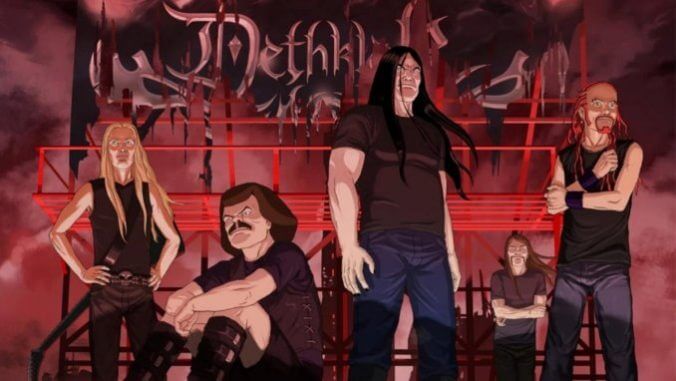Metalocalypse: Army of the Doomstar Finds Camaraderie at the End of the World

It’s hard to be a rock god, especially one with stubborn antisocial tendencies; with legions of frothing fans who would and actually do die on your behalf, in numbers large enough that they can’t possibly be good for business; with a molasses-speed learning curve; and the weight of humanity’s existence on your shoulders, because your bandmates can’t carry it with you (and even if they could, they might not). Brendon Small has played this tune on the world’s smallest electric violin for Dethklok, the stars of his Adult Swim series Metalocalypse, since 2006, when the show first aired. How to pity idiot kings who want for nothing and have everything on a scale that would make other gods jealous?
Metalocalypse: Army of the Doomstar gives that longstanding question its ultimate answer, wrapping up the series after four seasons, aired in 2006, 2007, 2009 and 2012, and a 2013 rock opera. Over the last decade and change, Small has given more than a few good reasons for viewers to feel sorry for Dethklok’s members; each of them has their own deep-rooted baggage, and with each passing iteration of the show, the baggage has gained in weight. This may be the natural end result of aging, not only Small’s but the band’s. Godhood and endless material resources can’t keep melodic death metal icons from going gray and wrinkly, and it’s probably true for most flesh-and-blood types that all the money in the world can’t satisfy the need for emotional substance and companionship. It gets real damn lonely on Olympus.
Nathan Explosion (Small), Dethklok’s hulking frontman, is feeling that loneliness as Army of the Doomstar opens. The film picks up where 2013’s Metalocalypse: The Doomstar Requiem leaves off, with Explosion unraveling under the strains of PTSD following the rescue of guitarist Toki Wartooth (series co-creator and co-writer Tommy Blacha) from the hands of the vicious Metal Masked Assassin (George “Corpsegrinder” Fisher, arguably the greatest institution of Metaloclypse’s real-life metal musician guest stars). Explosion puts his best foot forward with reviving Dethklok’s touring schedule, but collapses from the stress. All he needs is some R&R. All he gets is more stress. The band, which includes Toki, lead guitarist Skwisgaar Skwigelf (Small), Pickles the drummer (also Small), and bassist William Murderface (Blacha), is tasked with saving mankind from extinction, which is exactly the kind of thing a globally renowned metal outfit would sing about at least twice on each of their albums.
Dethklok is prophesied to sing the “Song of Salvation,” sparing Earth from devastation by preventing Metalocalypse’s overarching antagonist Mr. Salacia (Mark Hamill) from rising to full power. The particulars of this ancient forecast are vague around the edges, but this is hardly the kind of show or film where the particulars are more important than the broad summary, which is simple: If Dethklok doesn’t play a truly kickass show on a literal world stage, then the world will turn into a giant writhing ball of corpses and lava, and Salacia will clean up whoever’s left alive in the cataclysm. Small writes himself an “out” to further establishing the show’s mythology with the return of Dick Knubbler, music producer and all around garbage person, now one of the top clerics in the Church of the Black Klok; Knubbler (whom Small also voices), when asked about the prophecy’s details, only responds “nobody knows” to each question in order.
-

-

-

-

-

-

-

-

-

-

-

-

-

-

-

-

-

-

-

-

-

-

-

-

-

-

-

-

-

-

-

-

-

-

-

-

-

-

-

-








































